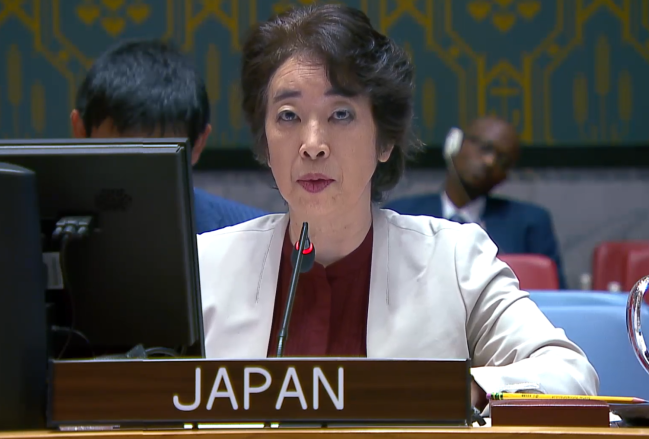Statement by H.E. Ambassador SHINO Mitsuko, Deputy Permanent Representative of Japan to the United Nations, at the United Nations Security Council Briefing, Agenda item “The situation in South Sudan”
2024/8/14

(As delivered)
Thank you, Mr. President, and I thank Mr. Haysom, Ms. Wosornu, and Major General Gituai for their insightful briefing. I also welcome the participation of the Permanent Representative of South Sudan in today’s meeting.
Mr. President,
Japan would like to thank all UNMISS personnel for their service in protecting civilians and mitigating violence in a challenging environment. As a TCC, we are committed to our continued deployments to UNMISS.
Concerning the current situation in South Sudan, I would like to make four points.
First, holding elections will be an important milestone in South Sudan’s transition process. Therefore, Japan hopes that preparations for the elections will be appropriately conducted. In this regard, Japan notes with concern the report by the Secretary-General, which observes that the preparations for the elections have been delayed considerably and that the “critical mass” of key benchmarks set out in the Revitalized Agreement on the Resolution of the Conflict in the Republic of South Sudan (R-ARCSS) have not yet been realized. Japan urges the Transitional Government of South Sudan and all parties to the R-ARCSS to intensify their efforts to advance the implementation of the requirements which they identified as critical for a democratic and successful end of the transitional period. Also, Japan calls on these parties to engage with each other to reach an agreement on the procedures and timeline for free, fair, and credible elections.
Second, the humanitarian situation has been worsened by prolonged intercommunal violence and the impact of the conflict in Sudan. Although the need for humanitarian assistance is increasing, the resources that the UN and other humanitarian agencies can rely on are shrinking due to insufficient funding. Poor infrastructure in South Sudan also hampers aid distribution. Moreover, we are worried that conditions may further deteriorate in the coming months due to possible large-scale flooding.
Japan therefore calls on the Transitional Government to strengthen its efforts to remove obstacles to humanitarian activities, including by ensuring greater freedom of movement for aid workers and resolving the taxation issue, in which certain charges are being applied on humanitarian assistance despite explicit exemption by South Sudanese legislations.
Third, we should not forget external factors that are impacting South Sudan including the continuing conflict in Sudan and the increasing damage of natural disasters due to climate change. It is important for the international community to build up South Sudan’s capacity to cope with the influx of returnees, refugees and asylum seekers from Sudan in cooperation with international humanitarian actors.
Fourth, Japan remains appreciative of the continuous efforts made by Kenya under the Tumaini Initiative, as well as the roles of UNMISS, IGAD and the AU under the trilateral configuration.
Mr. President,
We reiterate our strong commitment to the people of South Sudan and their aspirations for peace and prosperity through completing the process set out in the Revitalized Agreement.
Thank you, Mr. President.
